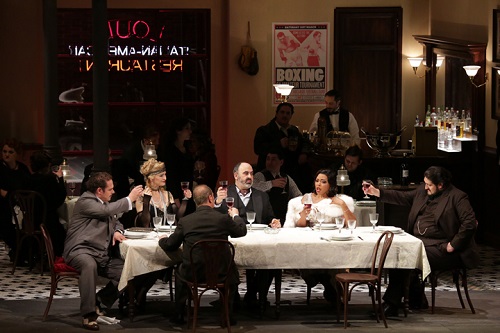 Italy Giordano, La cena delle beffe: Teatro alla Scala orchestra, Carlo Rizzi (conductor), Milan’s La Scala, 20.4.2016. (JMI)
Italy Giordano, La cena delle beffe: Teatro alla Scala orchestra, Carlo Rizzi (conductor), Milan’s La Scala, 20.4.2016. (JMI)

New Production:
Direction: Mario Martone
Sets: Margherita Palli
Costumes: Ursula Patzak
Lighting: Pasquale Mari
Cast:
Giannetto Malespini: Marco Berti
Ginevra: Kristin Lewis
Neri Chiaramantesi: Nicola Alaimo
The Doctor: Bruno de Simone
Lisabetta: Jessica Nuccio
Gabriello Chiaramantesi: Leonardo Caimi
Il Tornaquinci: Luciano Di Pasquale
Fazio: Frano Lufi
Cintia: Chiara Isotton
Umberto Giordano is mostly known as a composer of one opera (Andrea Chenier), although his Fedora was popular some 20 years ago, but has recently fallen into oblivion. I find it is an interesting policy to recover his works, as in the case of this, his penultimate opera, La cena delle beffe, that premiered at La Scala in December 1924, under the baton of Arturo Toscanini and with the presence in the leading role of Spanish tenor Hipólito Lázaro. It returned again two years later and that was it. In the 80s there were some performances of this opera in Wexford and in some Italian theatres, involving Daniela Dessi and Fabio Armiliato. In this opera Umberto Giordano lacks the inspiration he showed in Andrea Chenier and even in Fedora, offering his best music in the second part of the work, with the drawback that he wrote no aria for the protagonists, although they all have opportunities to shine in ariosos and duets. I fear that the laudable attempt by La Scala will not be carried forward.
The title could be translated as ‘The Dinner of Mockeries’, to which are invited, at the order of Lorenzo the Magnificent, the two opposing rivals Giannetto Malespini and Neri Chiramantesi, in order to make peace between them. Far from it, the dinner becomes the beginning of the revenge of Giannetto over Neri that will end with the involuntary assasination of Gabriello by his brother Neri, who surprises him in bed with the courtesan Ginevra, believing he was Giannetto.
The stage production is by Mario Martone, who takes the action to Little Italy at the time of the premiere of the opera and the transposition works fine, as if the two rivals were the bosses of two mafia gangs. The action is well narrated, but I find superfluous the final massacre, in which no one is left alive. The stage consists of three different sets that move up and down, offering the first act in a restaurant, where dinner takes place. In the second act we go to the top stage, where Ginevra’s rooms are located. In the third act we are in an underground, witnessing the confrontation of Neri and his historical victims, in one of the dramatically weakest scenes of the opera. Finally, the last act is again placed in the rooms of Ginevra. Aesthetically, the production is attractive. It has well suited costumes and a good work of lighting. The stage direction works good, but I missed a more expressive acting from the protagonists, who fell short in this regard with the exception of Nicola Alaimo on the part of Neri.
In the musical direction we had Carlo Rizzi and I found his conducting not beyond effectiveness. I have the impression that he could have gotten more out of the score, especially in the second part of the opera. The Orchestra of the Teatro alla Scala was not the outstanding orchestra we are used to listen from them. If I am not mistaken they are also now involved in a series of concerts in Europe.
It is not easy to assemble an outstanding cast for an opera that the performers will surely never sing again. It is obvious that the big stars may not be present, although I found this to be good cast under the circumstances.
The main character of the opera is Giannetto, the object of the painful mockeries by Neri before the opera starts, and the author of revenge on his rival afterwards. It needs a spinto tenor and Marco Berti responds well to these characteristics. The voice is bright, but once again he fell short in his interpretation.
American soprano Kristin Lewis was a correct Ginevra, although her voice lacks brightness and amplitude and she is not a paragon of expression.
The best in the cast was Nicola Alaimo as Neri, always convincing on stage and with a voice well-suited to his role, although with the problem that his voice projection could be better.
The other characters are just secondary roles. The best among them was soprano Jessica Nuccio as Lisabetta. Tenor Leonardo Caimi went virtually unnoticed as Gabriello. Bruno De Simone was a correct Doctor. Luciano Di Pasquale was effective as Il Tornaquinci.
José M. Irurzun